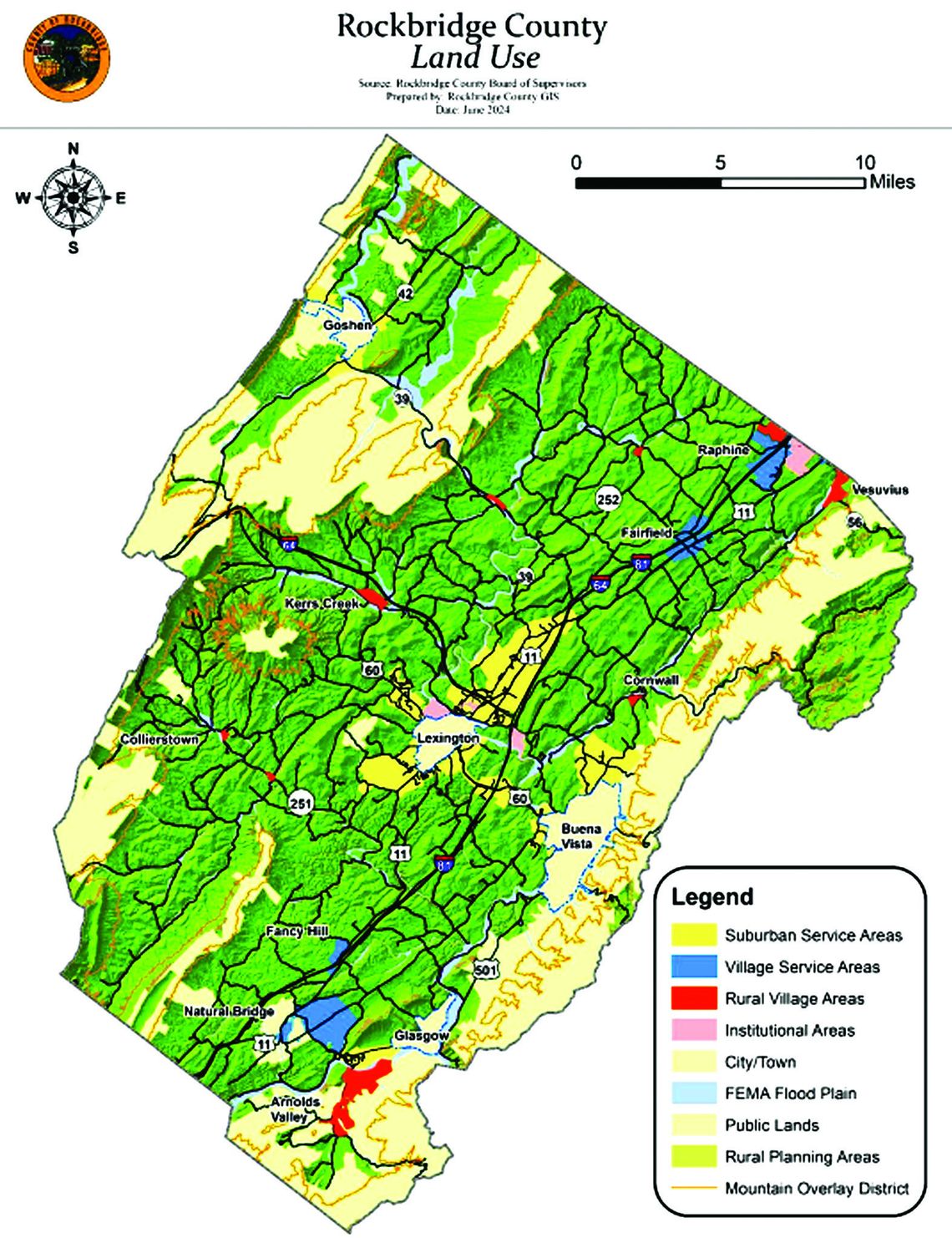Speakers Decry Zoning During Public Hearing
Utility-scale solar facilities don’t belong on agriculturalzoned lands.
That’s a point that was made repeatedly by citizens speaking at a public hearing held by the Rockbridge County Planning Commission last Wednesday, July 10, on proposed revisions to the county’s Comprehensive Plan.
“Go anywhere where there’s a solar field in the county, pull up the zoning map and what does it say? It says agricultural. You look at that map and you think that’s agricultural. But it’s not; it’s industrial,” said Steve Hart. “I know because I live right across the street from one and I look at it every day. And, as these things continue to proliferate in the county, our zoning map is not going to be honest. It might be accurate but it’s not going to be honest. It’s zoned agricultural but it’s got an industrial use on it.”
The county’s current land use regulations allow solar facilities on agriculturalzoned lands with a special exception permit. A committee has been working on a planned new ordinance that is to address solar facilities as a land use. A draft of a proposed ordinance is to go before the Planning Commission shortly but that issue is being handled separately from the process of updating the Comprehensive Plan.
The Commission last week recommended approval of the latest draft of the Comprehensive Plan (see separate story). The Board of Supervisors is holding a public hearing on the proposed revisions to the plan this Monday, July 22.
From reading the draft, Tripp Almy said he found that a major goal of the Comprehensive Plan is to “preserve the rural character of the county. Similar statements are found throughout the [plan], reinforcing the high priority of this goal. So, taking that into consideration I would suggest that the special use exceptions for large-scale industrial solar plants, which are defined as greater than 1 megawatt, in agricultural zoned areas are anathema to the stated goal of preserving our rural character. Industrial solar plants belong on industrial zoned lands and not rural agricultural lands.”
Such plants, he said, “negatively impact our ecosystem by putting direct pressure on farming and our food supply. Per data in the comprehensive plan, the number of farms in Rockbridge County in 2022 decreased 15 percent, resulting in a net loss of nearly 10,000 acres of farmland. Permitting industrial scale solar plants by special use exception will only accelerate the loss of farmland in our county.”
Bill Russell said he’s read the draft of the plan “in total” and he likes it. “I believe it attempts to do the right things for the right reasons. My concerns, particularly with regard to utility-scale solar, is that the special use exception process is undermining the plan. [The plan] sets out concerns, it sets out goals; it sets out reasons for certain actions in zoning. And yet we turn around and undermine those by accepting special use exceptions.”
According to Russell, “We live in a society that has an increasing distrust of government process. When we do things that undermine people’s certainty and expectations such as here is what the zone is, you can build a house here and don’t expect there’s going to be a utility next to it, we further undermine that.”
Steve Kator suggested that using the special exception process to allow solar facilities on farmland is leaving the county vulnerable to legal challenges. He alluded to a lawsuit filed by Volcano Energy earlier this year over the county’s denial of its application for a solar facility off of U.S. 11 and Steeles Fort Road. The lawsuit states that the decision was “was arbitrary, capricious, unreasonable ... I don’t know if their case has merit but it points to some of the problems with the county’s current process of permitting utility-scale power generating facilities in agricultural zones by special exception.”
Kator said he’d seen a draft of a proposed solar ordinance that “includes language that allows exceptions on nearly every point. Anything that can be measured, there’s always a phrase that this can be changed, depending on circumstances. So, it really does not address the arbitrary and capricious nature of the current special exception permit process.” He said the Comprehensive Plan and the proposed new solar ordinance should have language that “restricts new utility-scale energy projects to industrial zones.”
When considering special exception permits for solar facilities on agricultural- zoned land, Charles Bedell asked, does the Planning Commission consider whether the local utility companies have sufficient capacity to meet the needs of their customers in the county? “If it isn’t needed in this area, why are we taking the chance of putting agricultural and other valuable areas into a new category that could diminish their value? … We should carefully review and make sure that we’re not making exceptions here to benefit data centers in Northern Virginia or somewhere else.”
Several of the speakers said they were affiliated with an organization called the Rockbridge Taxpayers Alliance that passed a resolution asking the county to restrict utility scale energy projects to industrial-zoned land.
The resolution states that the special exception process has been used to “circumvent the designated protections to the detriment of specifically enumerated agricultural, conservation and residential use protections; …” The RTA asks that the county’s land use ordinances be amended to restrict these energy projects to designated industrial-zoned districts.
.jpg)


